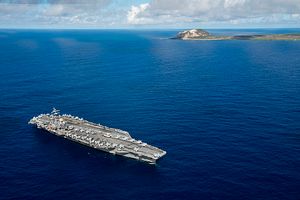A few stories on Asian security you may have missed in the last week:
Chinese ships back near the Senkaku/Diaoyu Islands. Japan’s Coast Guard identified three Chinese coast guard ships inside Japan’s territorial waters off the disputed Senkaku/Diaoyu Islands in the East China Sea over the weekend. The Chinese vessels spent around two hours in Japan’s territorial waters. The incursion is the first since September 19. Separately, one of the two Japanese men detained by China on charges of espionage in May was arrested on the Nanji islands in the East China Sea. The Nanji island chain is roughly 300 kilometers northwest of the Senkakus (which are uninhabited). China is supposedly building a military outpost on the islands; imagery released earlier in the year by IHS Jane‘s shows a heliport and other military facilities.
Russia will hold off on recognizing North Korea’s nuclear weapons program. Though relations between Moscow and Pyongyang have displayed some signs of rapprochement, particularly in the months after Russia’s estrangement from the West over its annexation of Crimea, the Russians won’t accept North Korea as a nuclear weapon state. This is in line with how other parties to the Six-Party Talks process, which has been stalled since 2008, view North Korea. Russian deputy foreign minister Igor Morgulov noted on Sunday that “It is never acceptable for Russia to effectively recognize North Korea’s status as a nuclear possessing country.” However, Morgulov wasn’t entirely dismissive of North Korea’s decision to pursue a nuclear weapons program: “At the foundation of North Korea’s choice of nuclear weapons were concerns over their own national security,” he noted identifying the U.S.-South Korea alliance as a threat to North Korea’s security.
Aircraft carrier switcheroo in the Pacific. The USS Ronald Reagan arrived in Yokosuka, Japan last week to replace the USS George Washington, which will undergo a four-year upgrade and maintenance cycle in addition to a refueling of its nuclear core in Norfolk, Virginia. With its arrival in Yokosuka, the USS Ronald Reagan becomes the U.S. Navy’s sole forward-deployed aircraft carrier and the fifth to be based in Japan. According to U.S. Secretary of the Navy Ray Mabus, the United States has had a carrier continunously in Japan for 42 years straight. “The critical importance of the carrier being here, both the substance and the symbolism, cannot be overstated,” Mabus added, speaking at the arrival ceremony.
The Indian Ocean great game. Over at Foreign Affairs, Rani D. Mullen and Cody Poplin offer a comprehensive update on the current status of India-China competition in the Indian Ocean region. Both New Delhi and Beijing are flinging cash and hardware around the region in a bid to gain leverage over littoral states.
A hardening of views. The New York Times recounts Colonel Liu Mingfu’s influence over hard-line military thinking in China. Liu, one of the few “public” intellectual types to come of the People’s Liberation Army, has wide influence according to the piece. Since Xi Jinping’s rise to power in China, views like his have bubbled to the top of public discourse in China regarding the country’s place in the world.
































